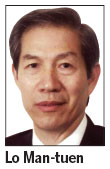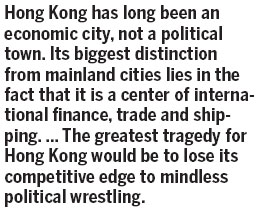Central govt's concerns about HK
Updated: 2013-05-10 06:16
By Lo Man-tuen(HK Edition)
|
|||||||

Zhang Dejiang, chairman of the National People's Congress Standing Committee (NPCSC), said at a meeting with members of the Business and Professionals Alliance for Hong Kong in Beijing last month that Hong Kong needs to realize that it is losing some of its competitive edges and should concentrate harder on economic development.
Zhang's speech can be summed up as relaying the central government's three worries about and three expectations for Hong Kong.
The three worries are as follows: First, Hong Kong's diminishing competitive edges; second, the city missing out on a critical window of opportunity for development due to political exhaustion; and third, its accumulating and fomenting deeper problems are on the rise.
The three expectations, meanwhile, are for Hong Kong to: First, reinforce its competitive edges; second, avoid internal political wrangling; and third, solve deeper problems as best it can.

The most important of the three expectations is of course economic development. The central authorities have always been concerned that Hong Kong's development would be compromised by excessive political wrestling. The central government was hoping to begin public discussion about the implementation of universal suffrage next so that Hong Kong could have more time to focus on economic development and people's well-being. Unfortunately the "pan-democracy" camp not only insists on the SAR government presenting a plan for the 2017 Chief Executive Election by universal suffrage sooner rather than later, but also is preparing an "Occupy Central" campaign to provoke Beijing.
Naturally the central authorities are deeply worried that Hong Kong society will be forced to spend most of its time and energy on political squabbling at the expense of economic development and people's livelihood. That is why and how state leaders found it necessary to publicly remind Hong Kong of the importance of focusing on economic development.
Zhang also pointed out that the next three years are crucial for Hong Kong to shake off the blues of the lingering global economic crisis by forging new competitive edges. His words not only reflect the latest bearing of the global economic situation but also serve as a reminder for Hong Kong not to squander this opportunity because time waits for no one.
Right now countries around the world are focusing on leaving the economic crisis behind and revitalizing their economic development. US President Barack Obama is pushing for the reduction of budget deficit and welfare spending despite tremendous pressure, so the country can shed some dead weight as it recovers from the debt crisis. Even with rising labor costs he is determined to make it a federal policy to convince big businesses to move their production facilities back to the United States in a bid to rejuvenate the manufacturing industry. In Europe, meanwhile, Germany and France are holding the European Union together as best as they can in applying policies in a desperate attempt to prevent the debt crises of member states from worsening and gradually restore economic order. BRICS countries such as China and Russia are stepping up unity and cooperation, including the establishment of a BRICS development bank and emergency reserve fund. Asia boasts the fastest economic growth in the world and the Association of Southeast Asian Nations, as an important part of the continent, is also emphasizing internal unity and advancing internal integration.
With the rest of the world working hard to develop the economy and end the financial crisis, Hong Kong has no reason whatsoever not to concentrate on its own economic development. It must not lose the opportunity for development to political wrangling.
Hong Kong has long been an economic city, not a political town. Its biggest distinction from mainland cities lies in the fact that it is a center of international finance, trade and shipping. That unique position is also its best competitive edge in making significant contributions to the nation's development. The greatest tragedy for Hong Kong would be to lose its competitive edge to mindless political wrestling.
The author is deputy director of the CPPCC Foreign Affairs Committee.
(HK Edition 05/10/2013 page1)